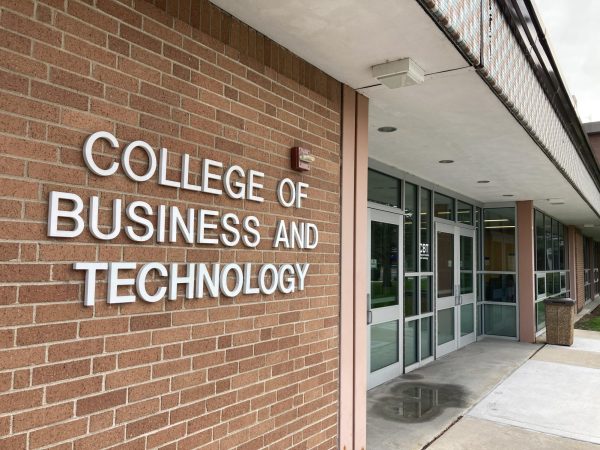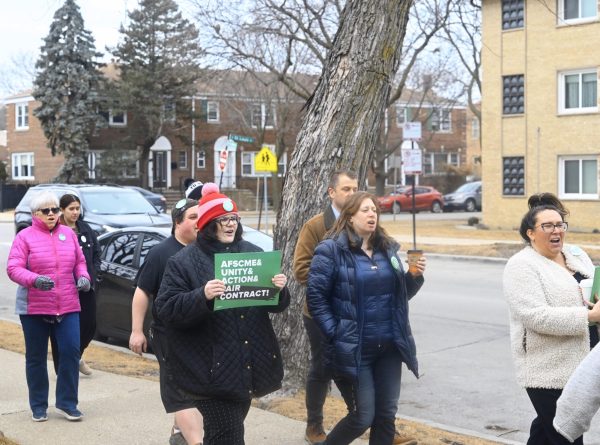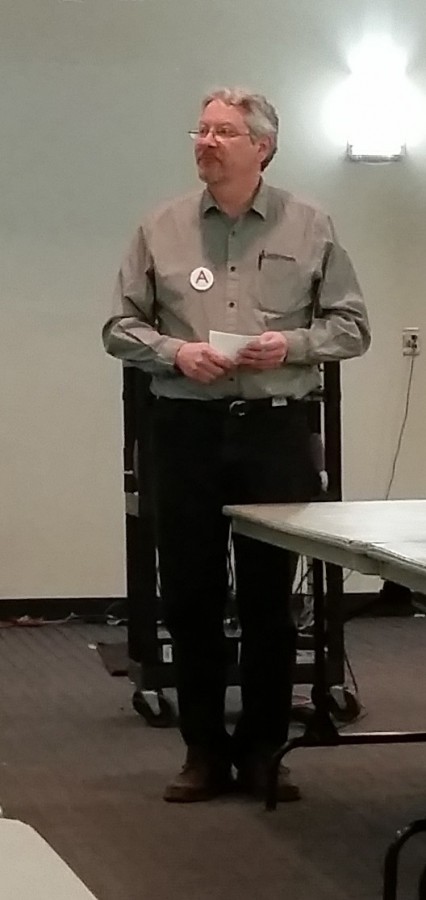Wear The Letter ‘A’ For Adjunct With Pride Not Shame
Paul Lemke addressing the audience at the teach-in
The scarlet letter A, synonymous for adulterer, could now stand for adjunct professors as well.
At least, that’s the sentiment of many part time professors at NEIU seen wearing buttons with a big bright-red A on their shirts during National Adjunct Walkout Day.
“Even though most of us already have PhDs they’ll never consider us because we’ve already had the scarlet letter A emblazoned on our foreheads,” said Lydia Snow when referring to long term job stability. A teach-in was held in the Student Union building on Feb. 25, where the professors gathered for their cause.
The death of Margret Mary Vojtko, an adjunct professor from Duquesne University in Pennsylvania, is what sparked Snow and colleagues to write a petition to fight for the rights of part-time professors. Vojtko, who had taught 25 years at the university as a French teacher, had been suffering from cancer and died at age 83 only a short distance from her home soon after she had been let go from her job.
Snow had then been appointed to NEIU’s university advisory council where she thought she would aid her fellow adjuncts and prevent other professors form losing their jobs like Vojtko.
Paul Lempke, a part-time instructor at the NEIU art department voiced his own experience. Lempke has been referred to at other universities and institutions by various titles such as a T.A., lecturer, visiting artist, and assistant professor. He explained how he’s had to work at multiple universities simultaneously and, mentioned how stressful this process can be and how it would affect the office hours he could provide for his students.
“One day I’m here, one day in the next county, and more and more online,” said Lempke, describing the hectic schedule he had to endure simply to teach enough classes to receive a livable paycheck.
Snow, an instructor in NEIU’s music department addressed those who attended the teach-in with a short speech she wrote prior to the event. The speech described an event that took place during her first year at NEIU, when she went to lunch with a guest music teacher who had chastised her wardrobe. The guest teacher said Snow’s suit was two sizes too large and told her she needed a fashion advisor and offered to go shopping with her.
This caused her to become emotional because she had been in debt, wouldn’t be paid for two weeks, and as an adjunct professor working only part time, could only afford attire from secondhand clothing stores. A colleague had come to her defense in saying her suit had been a nice color.
Finding clothes that fit and were affordable isn’t the only challenge she and other adjunct professors had to face.
She described the instability of such a job, and said, “The academic working life is so precarious that it appears to be like a mirage.”
She detailed the hassles of office hours and hectic schedules. She said it didn’t leave enough time for her or her students. Such uncertainty can pose a great financial issue.
“A Wal-Mart employee has more security than an adjunct professor,” said Snow.
Many other professors nodded their heads in agreement.
Snow continued to explain how the issue is only worsening, “The administration was plotting how to rid the University of instructors and their health care costs, and at the same time recruiting for more and better paid administrators.”
NEIU had also been cutting classes permanently which cut hours from part time professors.
Richard Grossman, a PhD graduate from the University of Chicago and part-time instructor in NEIU’s history department has been with the university since 1999. He said, “(Snow) summed up all our feelings so eloquently.”
Grossman relayed his sentiments for Bruce Rauner’s 30 percent budget cuts from higher education and referred to him as, “Our new, but hopefully soon-to-be ex-governor.”
Grossman has been teaching for 30 years and the most courses he’s taught in one semester has been seven to eight and the most universities he’s had to work in at one time has been four. He explained that he had done this simply to make “a living wage.”
Although Grossman cares to retire, he said, “Except one little problem, I can’t afford to.” He believes there has been an ongoing devaluation of higher education in this country especially in regards to adjunct professors but still loves being a teacher.
“This is my vocation; this is why I’m here. But, but I do have to pay bills, and that’s all I’m asking for; and that’s all any adjunct wants,” said Grossman. He said he’s “exhausted all the time,” trying to make a decent salary and pay the bills, and worries whether he will “still have a job the next year, the year after, (and) the year after?”
Olivia Cronk, from the English department, had the same worries. She’s been an adjunct for five years, but even as a full-time instructor she felt she could lose her job with a pregnancy. She related her struggles and kinship to other adjunct professors by sharing that her salary as an adjunct, “was less than I made as a waitress in graduate school.”
Carmel O’Kane, of the Spanish department, agonized on how little an adjunct professor is paid week to week. Another issue she mentioned was school equipment being underfunded. She described sharing one office with five other instructors and having one dysfunctional 20-year-old computer.
“Please, can we have working technology?” said O’Kane as she pointed out a statement she read, “Faculty working conditions are students’ learning conditions.”
She believes adjunct professors, and all the professors and faculty at NEIU, need more support from the administrators. She added that what they do to save money such as class cuts only does more harm, “taking away course offerings for students is a huge detriment for them.”
Perlow is an assistant professor at NEIU and on track to tenure in sociology, women and gender studies and African-American studies. Perlow stated that adjunct professors needed to “challenge fellow faculty members” and should not be scared to “be more political” and “be more involved in the national movement.”
Your donation will support the student journalists of Northeastern Illinois University's The Independent, either in writers' payment, additional supplies and other items of note. Your contribution will allow us to purchase additional equipment for writers/photographers/illustrators and cover our annual website hosting costs.
Laura Rojas






